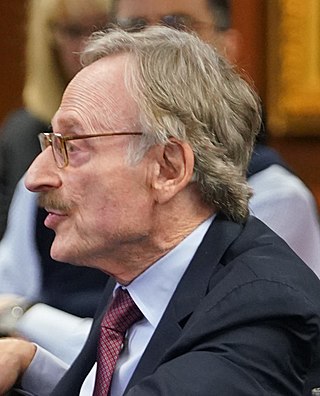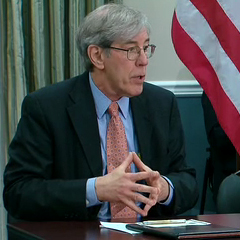Related Research Articles

Reaganomics,or Reaganism,were the neoliberal economic policies promoted by U.S. President Ronald Reagan during the 1980s. These policies are characterized as supply-side economics,trickle-down economics,or "voodoo economics" by opponents,including some Republicans,while Reagan and his advocates preferred to call it free-market economics.

Arthur Betz Laffer is an American economist and author who first gained prominence during the Reagan administration as a member of Reagan's Economic Policy Advisory Board (1981–1989). Laffer is best known for the Laffer curve,an illustration of the theory that there exists some tax rate between 0% and 100% that will result in maximum tax revenue for government. In certain circumstances,this would allow governments to cut taxes,and simultaneously increase revenue and economic growth.

Paul Adolph Volcker Jr. was an American economist who served as the 12th chairman of the Federal Reserve from 1979 to 1987. During his tenure as chairman,Volcker was widely credited with having ended the high levels of inflation seen in the United States throughout the 1970s and early 1980s,with measures known as the Volcker shock. He previously served as the president of the Federal Reserve Bank of New York from 1975 to 1979.

Hans Eichel is a German politician (SPD) and the co-founder of the G20,or "Group of Twenty",an international forum for the governments and central bank governors of twenty developed and developing nations to discuss policy issues pertaining to the promotion of international financial stability.

James Thomas Lynn was an American cabinet officer and government official. He served as the Secretary of Housing and Urban Development from 1973 until 1975 and as the director of the Office of Management and Budget from 1975 until 1977.

The Congressional Budget Office (CBO) is a federal agency within the legislative branch of the United States government that provides budget and economic information to Congress. Inspired by California's Legislative Analyst's Office that manages the state budget in a strictly nonpartisan fashion,the CBO was created as a nonpartisan agency by the Congressional Budget and Impoundment Control Act of 1974.

Alice Mitchell Rivlin was an American economist and budget official. She served as the 16th vice chair of the Federal Reserve from 1996 to 1999. Before her appointment to the Federal Reserve,Rivlin was named director of the Office of Management and Budget in the Clinton administration from 1994 to 1996. Prior to that,she was instrumental in the establishment of the Congressional Budget Office and became its founding director from 1975 to 1983. A member of the Democratic Party,Rivlin was the first woman to hold either of those posts.

James Clifford Miller III is an American economist and former government official who served as chairman of the Federal Trade Commission (FTC) between 1981 and 1985 and as Budget Director for President Ronald Reagan between 1985 and 1988. Miller was the first member of the FTC with a background as a career economist,as opposed to a legal background as is common.

Robert Glenn Hubbard is an American economist and academic. He served as the Dean of the Columbia University Graduate School of Business from 2004 to 2019,where he remains the Russell L. Carson Professor of Finance and Economics. On September 13,2018,he announced that he would retire from his position after his contract expired on June 30,2019. Hubbard previously served as Deputy Assistant Secretary at the U.S. Department of the Treasury from 1991 to 1993,and as Chairman of the Council of Economic Advisers from 2001 to 2003.

Stephen Moore is an American conservative writer and television commentator on economic issues. He co-founded and served as president of the Club for Growth from 1999 to 2004. Moore is a former member of the Wall Street Journal editorial board. He worked at The Heritage Foundation from 1983 to 1987 and again since 2014. Moore advised Herman Cain's 2012 presidential campaign and Donald Trump's 2016 presidential campaign.

Michael Jay Boskin is the T. M. Friedman Professor of Economics and senior fellow at Stanford University's Hoover Institution. He also is chief executive officer and president of Boskin &Co.,an economic consulting company,and serves on the Commerce Department's Advisory Committee on the National Income and Product Accounts.
The Peter G. Peterson Foundation is an American billionaire-funded foundation established in 2008 by Peter G. Peterson,former US Secretary of Commerce in the Nixon Administration and co-founder of the Blackstone Group,an American financial-services company.

Lawrence Alan Kudlow is an American conservative broadcast news analyst,columnist,journalist,political commentator,and radio personality. He is a financial news commentator for Fox Business and served as the Director of the National Economic Council during the Trump Administration from 2018 to 2021. He assumed that role after his previous employment as a CNBC television financial news host.
The Committee for a Responsible Federal Budget (CRFB) is a non-profit public policy organization based in Washington,D.C. that addresses federal budget and fiscal issues. It was founded in 1981 by former United States Representative Robert Giaimo (D-CT) and United States Senator Henry Bellmon (R-OK),and its board of directors includes past heads of the House and Senate Budget Committees,the Congressional Budget Office,the Office of Management and Budget,and the Government Accountability Office.
Donald Baird Marron Jr. is an American economist,professor and policy advisor and director of the nonpartisan Urban-Brookings Tax Policy Center in Washington,D.C. He is the son of the economist and financier Donald B. Marron Sr.

Maya MacGuineas is president of the Committee for a Responsible Federal Budget. She is a frequent commentator on issues such as the federal budget,national debt,taxes,the economy,retirement policy,government reform,and health care.
The National Commission on Fiscal Responsibility and Reform was a bipartisan Presidential Commission on deficit reduction,created in 2010 by President Barack Obama to identify "policies to improve the fiscal situation in the medium term and to achieve fiscal sustainability over the long run". The 18-member Commission,consisting of 12 members of Congress and six private citizens,first met on April 27,2010. A report was released on December 1,recommending a combination of spending cuts and tax increases.

Robert Danton Reischauer is an economist and was one of the two public trustees of the Medicare and Social Security Trust Fund. He is a nationally known expert on the federal budget,health reform,Medicare,and Social Security. Most recently (2000–2012) he served as president of the Urban Institute,a think tank based in Washington,D.C. He is the son of Japan scholar Edwin O. Reischauer.

C. Eugene "Gene" Steuerle is an American economist,a Richard B. Fisher chair and Institute Fellow at the Urban Institute in Washington,DC,and a columnist under the title The Government We Deserve.
June E. O'Neill is an American economist who was the director of the United States Congressional Budget Office (CBO) from March 1,1995,through January 29,1999. She was born to Louis and Matilda (Liebstein) Ellenoff on June 14,1934,and attended Sara Lawrence College,graduating in 1955. Prior to receiving her PhD from Columbia University,she taught at Temple University. Later,she worked at the Council of Economic Advisors as a senior economist,a research associate at the Urban Institute and the Brookings Institution,served as director of the office of policy and research for the United States Commission on Civil Rights,and both before and after her time as director of the CBO,as director of the Center for Study Business and Government at Baruch College,where she is currently the Morton Wollman Professor of Economics.
References
- ↑ Center on Federal Financial Institutions. Our People - RG Penner. Retrieved 25 March 2017.
- ↑ Jonathan Fuerbringer. OFFICIALS FORESEE RUDOLPH PENNER AS CONGRESS'S TOP BUDGET EXPERT, New York Times on-line, 18 July 1983. Retrieved 25 March 2017.
- ↑ Urban Institute. Rudolph G. Penner. Retrieved 25 March 2017.
- ↑ Committee for a Responsible Federal Budget. Board Members. Retrieved 6 October 2019.